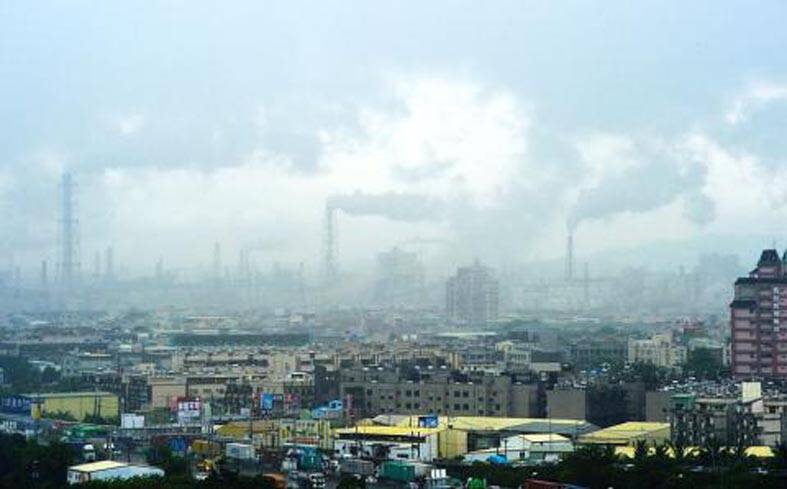Exposure to air and noise pollution could quadruple the risks of cardiovascular diseases, diabetes and other conditions that fall under metabolic syndrome, a Taiwanese study published in Science Reports Wednesday last week showed.
Coauthor Chan Ta-chien (詹大千), a research fellow at Academia Sinica’s Research Center for Humanities and Social Sciences, conducted the study using the health records of 1.7 million people and pollution data in Taipei from 2010 to 2016.
The research revealed that exposure to PM2.5 concentrations of 19.78 micrograms per cubic meter or more for just 24 hours per month was enough to cause a four-fold increase in metabolic syndrome risks, the epidemiologist said yesterday.

Photo: Chang Chung-i, Taipei Times
PM2.5 is particulate matter with a diameter of 2.5 micrometers or smaller.
The same length of exposure per month to noise pollution equal to or exceeding 67.77 decibels doubled metabolic syndrome risks while exposure to both types of pollution increased the risk by 3 percent over simple exposure, he said.
The PM2.5 and noise pollution levels used in the study were the average amount for urban areas near major traffic arteries, Chan said, adding that mixed residential and commercial zoning provides convenience to the detriment of public health.
The government can reduce the negative health impact of air and noise pollution originating from traffic by promoting public transportation and electric vehicles, while people can protect themselves by installing hermetically sealed windows and purifiers, he said.
In addition, green plants on balconies or window boxes can be used to absorb some of the PM2.5 pollution, he said.
In related news, a sustainability project funded by Academia Sinica showed that green curtains made of spider plants, sword ferns and regular ferns could help curb PM2.5 in urban areas.
A prepublished version of the study is available on the Building and Environment Web site.
The research team said that a green curtain consisting of 60 plants, which could be fitted in a 4.5 ping (15m2) balcony could remove 15 percent of PM2.5 in the surrounding air.
The plant types used in the study were selected for their suitability to subtropical climate and minute striations of their leaves that form dew to capture particulate matter, said coauthor Tsay Yaw-Shyan (蔡耀賢), professor of architecture at National Chung Kung University.
The plants do not require washing to perform this function since they are effectively self-cleaning, he said, adding that green curtains suspended on surfaces prevent the plants from taking root in the structure.
People interested in using other plants for their green curtain should use begonia grandis or Japanese honeysuckle, said coauthor Chung Hsin-ying (鍾興穎), associate professor of plant industry at National Pingtung University of Science and Technology.
These plants have layered leaves with fluff and striations which are conducive to forming dew, he said, adding that cactuses and roses are not good as they are too smooth.

Chinese Nationalist Party (KMT) Chairman Eric Chu (朱立倫), spokeswoman Yang Chih-yu (楊智伃) and Legislator Hsieh Lung-chieh (謝龍介) would be summoned by police for questioning for leading an illegal assembly on Thursday evening last week, Minister of the Interior Liu Shyh-fang (劉世芳) said today. The three KMT officials led an assembly outside the Taipei City Prosecutors’ Office, a restricted area where public assembly is not allowed, protesting the questioning of several KMT staff and searches of KMT headquarters and offices in a recall petition forgery case. Chu, Yang and Hsieh are all suspected of contravening the Assembly and Parade Act (集會遊行法) by holding

PRAISE: Japanese visitor Takashi Kubota said the Taiwanese temple architecture images showcased in the AI Art Gallery were the most impressive displays he saw Taiwan does not have an official pavilion at the World Expo in Osaka, Japan, because of its diplomatic predicament, but the government-backed Tech World pavilion is drawing interest with its unique recreations of works by Taiwanese artists. The pavilion features an artificial intelligence (AI)-based art gallery showcasing works of famous Taiwanese artists from the Japanese colonial period using innovative technologies. Among its main simulated displays are Eastern gouache paintings by Chen Chin (陳進), Lin Yu-shan (林玉山) and Kuo Hsueh-hu (郭雪湖), who were the three young Taiwanese painters selected for the East Asian Painting exhibition in 1927. Gouache is a water-based

Taiwan would welcome the return of Honduras as a diplomatic ally if its next president decides to make such a move, Minister of Foreign Affairs Lin Chia-lung (林佳龍) said yesterday. “Of course, we would welcome Honduras if they want to restore diplomatic ties with Taiwan after their elections,” Lin said at a meeting of the legislature’s Foreign Affairs and National Defense Committee, when asked to comment on statements made by two of the three Honduran presidential candidates during the presidential campaign in the Central American country. Taiwan is paying close attention to the region as a whole in the wake of a

OFF-TARGET: More than 30,000 participants were expected to take part in the Games next month, but only 6,550 foreign and 19,400 Taiwanese athletes have registered Taipei city councilors yesterday blasted the organizers of next month’s World Masters Games over sudden timetable and venue changes, which they said have caused thousands of participants to back out of the international sporting event, among other organizational issues. They also cited visa delays and political interference by China as reasons many foreign athletes are requesting refunds for the event, to be held from May 17 to 30. Jointly organized by the Taipei and New Taipei City governments, the games have been rocked by numerous controversies since preparations began in 2020. Taipei City Councilor Lin Yen-feng (林延鳳) said yesterday that new measures by